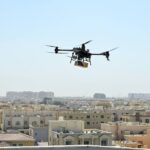ADIA boosts private equity as it seeks opportunities in challenging market
The Mideast’s largest sovereign wealth fund revealed a flat rate of return and increased exposure to China data centers in its 2022 annual report

The ADIA building on the Corniche in the UAE's capital. (ANDREW HOLBROOKE/GETTY)
ABU DHABI, United Arab Emirates – Sovereign wealth fund Abu Dhabi Investment Authority is increasing its allocation in private equities and eyeing investment opportunities in energy transition and technology.
ADIA, which re-invests oil revenues outside the UAE on behalf...










